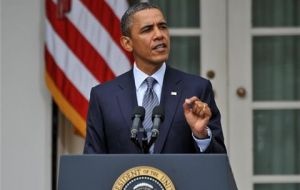MercoPress. South Atlantic News Agency
In three years the ‘Obama magic’ has turned irrelevant for most Latam leaders
 Obama is more focused on re-election than foreign policy
Obama is more focused on re-election than foreign policy Three years after being received by Latin American leaders as a super-star, US President Barack Obama faces scepticism and disappointment at this weekend’s Summit of the Americas for failing to meet promises of a new era in relations with the region.
Obama’s first meeting with leaders from the hemisphere in Trinidad and Tobago at the height of his popularity included a vow to mend ties with Cuba and a photo-op handshake with Hugo Chavez, the obstinate critic of the US.
This year in Colombia, Obama is more focused on re-election than foreign policy and is set to receive a grilling over contentious issues like the war on drugs, Cuba and even US monetary policy from heads of state eager to remind him that Washington is growing less relevant for the region.
“The deception and disappointment are quite real,” said Hal Klepak, a Canadian history professor and Latin America expert. “The last summit’s focus was the ‘Obama show,’ this time what we have are years of nothing happening.”
Latin American leaders generally favour Obama winning a second term, analysts say, in part because of some of the hard-line comments on immigration by the Republican presidential hopefuls. Mitt Romney, for example, upset some with remarks about immigrants facing “self-deportation” because they can’t find work.
But they are nonetheless set to press Obama on allowing Cuba entry into the next Americas summit and again challenge the 50-year-old US trade embargo against the Castro brothers regime. The embargo is widely seen within Latin America as an outdated Cold War-era policy.
And presidents spanning the political spectrum will push for a discussion of legalizing and reducing US demand for illegal drugs, seeking to shift responsibility for the problem toward the world’s top consumer.
“Colombia, and I myself, have put this issue on the table, because if there is any country that has suffered more from drug trafficking, that has shed more blood, it’s Colombia,” President Juan Manuel Santos, who is hosting the summit, said recently.
Obama can ill-afford to entertain changes to policy on Cuba or the war on drugs because they might alienate him from middle-of-the-road voters who will be crucial for his re-election bid.
“This is the worst moment to be proposing issues to the Americans in the run-up to a difficult and problematic election for President Obama,” said Andres Rozental, former deputy foreign minister of Mexico.
Republican critics have in the past said Obama’s efforts at dialogue with Cuba and Venezuela compromised national security.
But Obama is still popular among Latin Americans. A 2011 visit to a slum in Rio de Janeiro, for example, brought throngs of screaming admirers.
That contrasts with the violent protests that met former President George W. Bush at a 2005 regional summit in Argentina, where populist leaders torpedoed a hemisphere-wide free trade deal being pushed by the United States.
Facing budget battles at home and what will likely be a decline in foreign aid to Latin America this fiscal year, Obama heads to Cartagena with few favours to offer.
Brazil is frustrated with loose US monetary policy that has pushed a flood of capital into Brazil, driving up its currency and making its exports less competitive, and President Dilma Rousseff openly complained to Obama about it in a meeting at the White House last Monday.
An overhaul of US immigration rules has all but fallen off the agenda in the Washington, frustrating Mexico and Central American countries as well as Latino voters in the United States.




Top Comments
Disclaimer & comment rules-

-

Read all commentsHated everywhere he goes.
Apr 13th, 2012 - 10:30 pm 0Except Argentina, no one cares about the USA.
Apr 14th, 2012 - 01:56 pm 0Commenting for this story is now closed.
If you have a Facebook account, become a fan and comment on our Facebook Page!